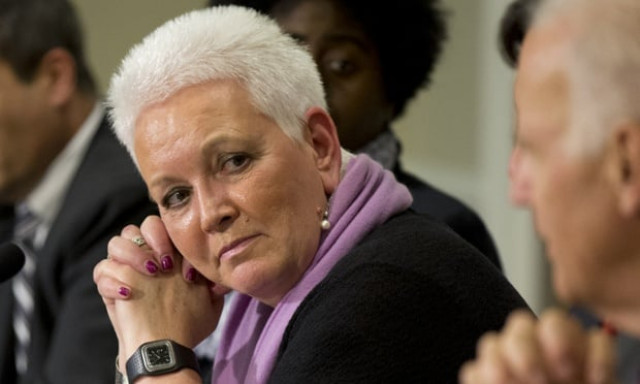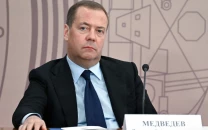As humanitarian needs grow, USAID chief says the world must act
'This is not the time to cut resources, the world has got to ante up at much higher level than is the case right now'

This Nov. 13, 2014, photo shows White House adviser Gayle Smith, attending a meeting with Vice President Joe Biden, on President Barack Obama administrations response to Ebola in the Eisenhower Executive Office Building at the White House compound in Washington. President Barack Obama tapped Smith on April 30, 2015, to run the US Agency for International Development, putting a former journalist and longtime Africa expert in charge of his global development agenda for the final years of his presidency. Smith, the senior director for development and democracy at the White House's National Security Council, has had a diverse career working on humanitarian efforts in and out of government, including a former stint at USAID.
AP PHOTO
Gayle Smith, the administrator of the US Agency for International Development (USAID), described a global humanitarian system stretched to the limit by the number of disasters and a growing funding gap compounded by emergency responses that cost more than traditional relief methods.
USAID to build 106 schools in Sindh
"This is not the time to cut resources," Smith said. "Everybody is facing financial trade-offs, but the world has got to ante up at a much higher level than is the case right now." Smith is set to lead the US delegation to the first UN World Humanitarian Summit on Monday and Tuesday in Istanbul, which will include donor countries, UN agencies and non-governmental organizations.
Frustrations with humanitarian crises in countries such as Syria and Afghanistan, where hospitals have been bombed, have bubbled into the open, with international relief agency Médecins Sans Frontières announcing it will boycott the gathering.
"The humanitarian system is both stressed and stretched to the limits by the number and complexity of crises," Smith said. "It has been a relentless drumbeat of very large, most often complex crises, the majority of which are chronic." The summit "needs to lay down serious markers for a global agenda," she said.
Curbing corruption: USAID team appreciates NAB’s measures
Smith cited a familiar list of crises and disasters that are testing humanitarian relief efforts: Syria's refugee crisis, the largest since World War II; the conflicts in South Sudan, Yemen and Iraq; the effects of the El Niño climate phenomenon in Africa; the Ebola epidemic; and increasingly destructive natural disasters such as Nepal's earthquake last year.
She said the meeting also must address the increasingly hostile work environments relief agencies are facing; make disaster response more efficient; develop new funding sources, and strengthen development programs so poorer countries can respond more quickly to crises. With the number of disasters growing, the gap between donor funding and estimated needs is also growing, she said.
According to the Financial Tracking Service, which follows global humanitarian aid flows, only 20 percent of the $18.2 billion needed for disasters has been covered.
Cooperation: ‘USAID helped generate 1,750MW’
In January, a UN panel estimated the world is spending some $25 billion a year to provide aid to 125 million people, more than 12 times the $2 billion spent in 2000.
The private sector also can provide support, Smith said, noting its larger role in recent years in fighting poverty. While lacking in experience managing disasters, the private sector can contribute funds and logistical assistance as needed, Smith added.


















COMMENTS
Comments are moderated and generally will be posted if they are on-topic and not abusive.
For more information, please see our Comments FAQ